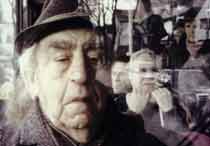
MARTIN
 Dachau on ikiaijoiksi merkitty historiaan kaupunkina, jossa oli natsien ylläpitämä keskitysleiri. Kaupunkilaiset itse haluavat unohtaa ja kieltää koko asian. Keskitysleiristä on tehty siisti turistialue, jossa pensaat peittävät luodinjäljet, eikä kaasukammioita tiedotteiden mukaan käytetty.
Dachau on ikiaijoiksi merkitty historiaan kaupunkina, jossa oli natsien ylläpitämä keskitysleiri. Kaupunkilaiset itse haluavat unohtaa ja kieltää koko asian. Keskitysleiristä on tehty siisti turistialue, jossa pensaat peittävät luodinjäljet, eikä kaasukammioita tiedotteiden mukaan käytetty.
Totuus on toinen. Elokuva Martin kertoo 87-vuotiaan Martin Zaidenstadtin tarinan. Hän selviytyi yli 50 vuotta sitten keskitysleiristä, mutta palaa sinne päivittäin kertomaan halukkaille, mitä oikein tapahtui. Martin menetti vaimonsa ja lapsensa keskitysleirissä.
Ohjaaja Ra'anan Alexandrowicz tapasin vanhuksen sattumalta vieraillessaan keskitysleirillä. Äkäiseen, vähäilmaiseen tapaansa Martin vei Alexadrowiczin ja tämän ystävät toisenlaiselle opastetulle kierrokselle. Martinin kokemukset alkoivat kiehtoa Alexandrowicziä, vaikkakaan täsmälliseen totuuteen ei aina voinut luottaa.
Välillä Martinin rooli vaihtuu sankarista epäluotettavaksi todistajaksi, sitten taas sankarista kärttyisäksi kiusankappaleeksi. Ohjaaja yhdistää nämä kaikki muotokuvaksi sankarista, jolla on omat inhimilliset puutteensa.
Kotivideokameralla kuvattu ja valokuvin tehostettu tarina antaa menetykselle ja kärsimykselle kasvot, jotka useimmiten on helpompi unohtaa. Martinin menneisyys on hänelle tuskallista nykyhetkeä.
Ja mikä loppujen lopuksi on totuus? Alexandrowicz alkaakin miettiä katsellessaan vanhaa Dachau-arkistofilmiä, että jonkunhan nämä valotkin on rakentanut ja joku on tämänkin ohjannut…
- Ohjaaja: Ra'anan Alexandrowicz
- Tuotanto: First Hand Films, Sveitsi, 1999
In English In English In English
MARTIN
 Martin tells the controversial story of Martin Zaidenstadt, an 87 year old Dachau KZ survivor that remained to live his life in the adjacent town of the camp. It is a strange and fickle story of a conflict between this man and his environment, spun out through the experiences of three young tourists who came for a 'routine' day trip to a KZ memorial and found more then they had expected.
Martin tells the controversial story of Martin Zaidenstadt, an 87 year old Dachau KZ survivor that remained to live his life in the adjacent town of the camp. It is a strange and fickle story of a conflict between this man and his environment, spun out through the experiences of three young tourists who came for a 'routine' day trip to a KZ memorial and found more then they had expected.
The film takes place in the 'back-stage' of a concentration camp memorial, and on the 'backdrop' of the town of Dachau. A town forever marked by its name and desperately attempting to change its image in the eyes of the world. The subjective tourist point of view, and the accidental manner in which Martin's story is told, open the film to basic questions about the relationship between memory and commemoration, about the construction of historical truth, and about the connection between the third generation and the Holocaust.
What drives a man to re-enter the gates of a concentration camp every day, fifty years after liberation?
The first and nearly accidental visit of three young tourists to the Dachau concentration camp memorial leads to an unexpected chain of events. Just as they are about to leave the memorial, disappointed with their experience, they notice in the distance an old man arguing with one of the Memorial workers.
The man notices the three tourists looking at him. He approaches them. He offers to explain to them what he remembers that had happened here, where now bushes and flowers bloom. The tourists follow the strange man around the memorial, taken by his stories and moved by his disapproval about the way Dachau is commemorated. When the old man finishes his say he gets on a public bus. The three follow him as far as he allows them, until he mysteriously disappears in the streets of the nearby town of Dachau.
The three young tourists, from different cultural and national backgrounds, find themselves returning to the camp during the following days in order to meet this old survivor, a man who apparently chose to live his life in the town adjacent to the camp in which he was imprisoned.
- Director: Ra'anan Alexandrowicz
- Production: First Hand Films, Switzerland, 1999

Päivitys: 22.3.2001 U.E.